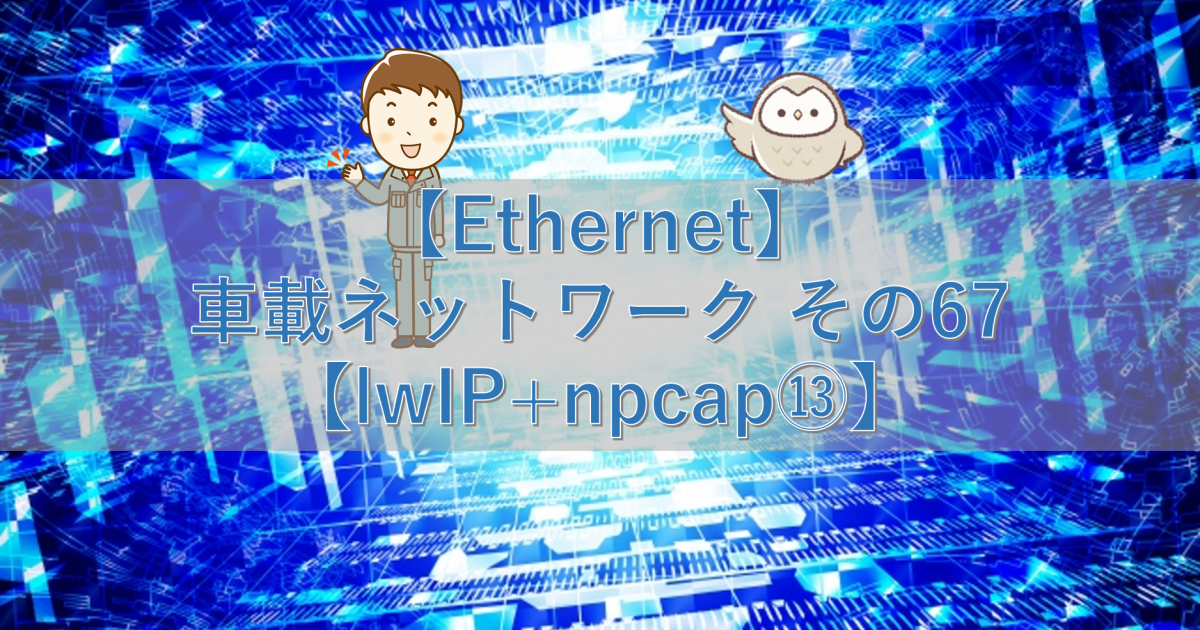バックナンバーはこちら。
https://www.simulationroom999.com/blog/In-vehicle-network-backnumber/
はじめに
lwIPのPC上でのシミュレーションをするための実装の話
登場人物
博識フクロウのフクさん

イラストACにて公開の「kino_k」さんのイラストを使用しています。
https://www.ac-illust.com/main/profile.php?id=iKciwKA9&area=1
エンジニア歴8年の太郎くん

イラストACにて公開の「しのみ」さんのイラストを使用しています。
https://www.ac-illust.com/main/profile.php?id=uCKphAW2&area=1
lwIPのPC上でのシミュレーションをするための実装

太郎くん
よし!
一通りわからんところは調べ尽くしたから後は実装だね。

フクさん
そうだね。

フクさん
もう大体できてるんじゃない?

太郎くん
まぁ調べながら実験してたんで、ある程度はできてるね。
シミュレーション用コード

太郎くん
こんな実装になった。
#include "pcap.h"
#include <Windows.h>
#include "lwip/init.h"
#include "lwip/netif.h"
#include "lwip/dns.h"
#include "netif/etharp.h"
#if LWIP_IPV6
#include "lwip/ethip6.h"
#include "lwip/nd6.h"
#endif
#include "lwip/apps/httpd.h"
#include <string.h>
#include <stdio.h>
/* This define enables multi packet processing.
* For this, the input is interpreted as 2 byte length + data + 2 byte length + data...
* #define LWIP_FUZZ_MULTI_PACKET
*/
u8_t pktbuf[20000];
pcap_t *pcap_fp;
/* no-op send function */
static err_t lwip_tx_func(struct netif *netif, struct pbuf *p)
{
BYTE *pbuf;
int i;
int cnt = 0;
err_t err = ERR_OK;
LWIP_UNUSED_ARG(netif);
while( p != NULL ) {
pbuf = (BYTE*)p->payload;
if ((p->len + cnt) > sizeof(pktbuf)) {
err = ERR_BUF;
break;
}
for( i =0 ; i < p->len; i++ ){
printf("%02X ", pbuf[i]);
if ( (i % 16) == 15) printf("\n");
pktbuf[cnt++] = pbuf[i];
}
p = p->next;
}
printf( "\n");
pcap_sendpacket(pcap_fp, // Adapter
pktbuf, // buffer with the packet
cnt // size
);
return err;
}
static err_t testif_init(struct netif *netif)
{
netif->name[0] = 'f';
netif->name[1] = 'z';
netif->output = etharp_output;
netif->linkoutput = lwip_tx_func;
netif->mtu = 1500;
netif->hwaddr_len = 6;
netif->flags = NETIF_FLAG_BROADCAST | NETIF_FLAG_ETHARP | NETIF_FLAG_IGMP;
netif->hwaddr[0] = 0x00;
netif->hwaddr[1] = 0x23;
netif->hwaddr[2] = 0xC1;
netif->hwaddr[3] = 0xDE;
netif->hwaddr[4] = 0xD0;
netif->hwaddr[5] = 0x0D;
#if LWIP_IPV6
netif->output_ip6 = ethip6_output;
netif->ip6_autoconfig_enabled = 1;
netif_create_ip6_linklocal_address(netif, 1);
netif->flags |= NETIF_FLAG_MLD6;
#endif
return ERR_OK;
}
static void input_pkt(struct netif *netif, const u8_t *data, size_t len)
{
struct pbuf *p, *q;
err_t err;
if (netif->input != NULL) {
LWIP_ASSERT("pkt too big", len <= 0xFFFF);
p = pbuf_alloc(PBUF_RAW, (u16_t)len, PBUF_POOL);
LWIP_ASSERT("alloc failed", p);
for (q = p; q != NULL; q = q->next) {
MEMCPY(q->payload, data, q->len);
data += q->len;
}
err = netif->input(p, netif);
if (err != ERR_OK) {
pbuf_free(p);
}
}
}
static void input_pkts(struct netif *netif, const u8_t *data, size_t len)
{
input_pkt(netif, data, len);
}
u32_t sys_now(void)
{
return GetTickCount();
}
void * sio_open(u8_t devnum)
{
return NULL;
}
void sio_send(u8_t c, void* fd)
{
}
u32_t sio_tryread(void* fd, u8_t *data, u32_t len)
{
return 0;
}
/* 4 bytes IP address */
typedef struct ip_address
{
u_char byte1;
u_char byte2;
u_char byte3;
u_char byte4;
}ip_address;
/* IPv4 header */
typedef struct ip_header
{
u_char ver_ihl; // Version (4 bits) + Internet header length (4 bits)
u_char tos; // Type of service
u_short tlen; // Total length
u_short identification; // Identification
u_short flags_fo; // Flags (3 bits) + Fragment offset (13 bits)
u_char ttl; // Time to live
u_char proto; // Protocol
u_short crc; // Header checksum
ip_address saddr; // Source address
ip_address daddr; // Destination address
u_int op_pad; // Option + Padding
}ip_header;
/* UDP header*/
typedef struct udp_header
{
u_short sport; // Source port
u_short dport; // Destination port
u_short len; // Datagram length
u_short crc; // Checksum
}udp_header;
/* prototype of the packet handler */
void packet_handler(u_char *param, const struct pcap_pkthdr *header, const u_char *pkt_data);
pcap_if_t *alldevs;
pcap_if_t *d;
int inum;
int i=0;
pcap_t *adhandle;
char errbuf[PCAP_ERRBUF_SIZE];
u_int netmask;
char packet_filter[] = "";
struct bpf_program fcode;
#ifdef _WIN32
#include <tchar.h>
BOOL LoadNpcapDlls()
{
_TCHAR npcap_dir[512];
UINT len;
len = GetSystemDirectory(npcap_dir, 480);
if (!len) {
fprintf(stderr, "Error in GetSystemDirectory: %x", GetLastError());
return FALSE;
}
_tcscat_s(npcap_dir, 512, _T("\\Npcap"));
if (SetDllDirectory(npcap_dir) == 0) {
fprintf(stderr, "Error in SetDllDirectory: %x", GetLastError());
return FALSE;
}
return TRUE;
}
#endif
int pcap_init()
{
#ifdef _WIN32
/* Load Npcap and its functions. */
if (!LoadNpcapDlls())
{
fprintf(stderr, "Couldn't load Npcap\n");
exit(1);
}
#endif
/* Retrieve the device list */
if(pcap_findalldevs(&alldevs, errbuf) == -1)
{
fprintf(stderr,"Error in pcap_findalldevs: %s\n", errbuf);
exit(1);
}
/* Print the list */
for(d=alldevs; d; d=d->next)
{
printf("%d. %s", ++i, d->name);
if (d->description)
printf(" (%s)\n", d->description);
else
printf(" (No description available)\n");
}
if(i==0)
{
printf("\nNo interfaces found! Make sure WinPcap is installed.\n");
return -1;
}
printf("Enter the interface number (1-%d):",i);
scanf("%d", &inum);
/* Check if the user specified a valid adapter */
if(inum < 1 || inum > i)
{
printf("\nAdapter number out of range.\n");
/* Free the device list */
pcap_freealldevs(alldevs);
return -1;
}
/* Jump to the selected adapter */
for(d=alldevs, i=0; i< inum-1 ;d=d->next, i++);
/* Open the adapter */
if ((pcap_fp = adhandle= pcap_open_live(d->name, // name of the device
65536, // portion of the packet to capture.
// 65536 grants that the whole packet will be captured on all the MACs.
1, // promiscuous mode (nonzero means promiscuous)
100, // read timeout
errbuf // error buffer
)) == NULL)
{
fprintf(stderr,"\nUnable to open the adapter. %s is not supported by WinPcap\n");
/* Free the device list */
pcap_freealldevs(alldevs);
return -1;
}
}
int pcap_main()
{
/* Check the link layer. We support only Ethernet for simplicity. */
if(pcap_datalink(adhandle) != DLT_EN10MB)
{
fprintf(stderr,"\nThis program works only on Ethernet networks.\n");
/* Free the device list */
pcap_freealldevs(alldevs);
return -1;
}
if(d->addresses != NULL)
/* Retrieve the mask of the first address of the interface */
netmask=((struct sockaddr_in *)(d->addresses->netmask))->sin_addr.S_un.S_addr;
else
/* If the interface is without addresses we suppose to be in a C class network */
netmask=0xffffff;
//compile the filter
if (pcap_compile(adhandle, &fcode, packet_filter, 1, netmask) <0 )
{
fprintf(stderr,"\nUnable to compile the packet filter. Check the syntax.\n");
/* Free the device list */
pcap_freealldevs(alldevs);
return -1;
}
//set the filter
if (pcap_setfilter(adhandle, &fcode)<0)
{
fprintf(stderr,"\nError setting the filter.\n");
/* Free the device list */
pcap_freealldevs(alldevs);
return -1;
}
printf("\nlistening on %s...\n", d->description);
/* At this point, we don't need any more the device list. Free it */
pcap_freealldevs(alldevs);
/* start the capture */
pcap_loop(adhandle, 0, packet_handler, NULL);
return 0;
}
struct netif net_test;
/* Callback function invoked by libpcap for every incoming packet */
void packet_handler(u_char *param, const struct pcap_pkthdr *header, const u_char *pkt_data)
{
struct tm *ltime;
char timestr[16];
ip_header *ih;
udp_header *uh;
u_int ip_len;
u_short sport,dport;
time_t local_tv_sec;
int i;
int notown = 0;
/*
* unused parameter
*/
(VOID)(param);
/* convert the timestamp to readable format */
local_tv_sec = header->ts.tv_sec;
ltime=localtime(&local_tv_sec);
strftime( timestr, sizeof timestr, "%H:%M:%S", ltime);
/* print timestamp and length of the packet */
printf("%s.%.6d len:%d ", timestr, header->ts.tv_usec, header->len);
/* retireve the position of the ip header */
ih = (ip_header *) (pkt_data +
14); //length of ethernet header
/* retireve the position of the udp header */
ip_len = (ih->ver_ihl & 0xf) * 4;
uh = (udp_header *) ((u_char*)ih + ip_len);
/* convert from network byte order to host byte order */
sport = ntohs( uh->sport );
dport = ntohs( uh->dport );
/* print ip addresses and udp ports */
printf("%d.%d.%d.%d.%d -> %d.%d.%d.%d.%d\n",
ih->saddr.byte1,
ih->saddr.byte2,
ih->saddr.byte3,
ih->saddr.byte4,
sport,
ih->daddr.byte1,
ih->daddr.byte2,
ih->daddr.byte3,
ih->daddr.byte4,
dport);
for( i = 0; i < header->len; i++ ){
printf( "%.2X ", pkt_data[i] );
if ( (i % 16) == 15) printf("\n");
}
printf( "\n\n");
for( i = 0; i < 6; i++ ){
if( pkt_data[i+6] != net_test.hwaddr[i]){
notown = 1;
break;
}
}
if( notown ){
input_pkts(&net_test, pkt_data, header->len);
}
}
int main(int argc, char** argv)
{
ip4_addr_t addr;
ip4_addr_t netmask;
ip4_addr_t gw;
size_t len;
pcap_init();
lwip_init();
IP4_ADDR(&addr, 192, 168, 11, 100);
IP4_ADDR(&netmask, 255, 255, 255, 0);
IP4_ADDR(&gw, 192, 168, 11, 1);
netif_add(&net_test, &addr, &netmask, &gw, &net_test, testif_init, ethernet_input);
netif_set_up(&net_test);
netif_set_link_up(&net_test);
#if LWIP_IPV6
nd6_tmr(); /* tick nd to join multicast groups */
#endif
/* initialize apps */
httpd_init();
pcap_main();
return 0;
}コード説明

フクさん
結構な規模になったねー!

太郎くん
大雑把な流れは以下だね。
①pcap初期化
②lwIP初期化
③ネットワークインターフェースにIPアドレス、ネットマスク、デフォルトゲートウェイを設定
④物理層のUP指示
⑤データリンク層へのUP指示
⑥HTTPサーバ初期化
⑦pcapの受信処理ループ

フクさん
とりあえず、次回から動作確認かな。
まとめ

太郎くん
まとめだよ。
- lwIP PCシミュレーション用のコードを書いた。
- pcapとlwIPそれぞれの初期化処理を実施。
- pcapのデバイスリストとディスクリプタ関連。
- lwIPのネットワークインターフェース関連。
- その後にアプリ層のHTTPサーバの初期化。
- 最後にpcapの受信処理ループ。
バックナンバーはこちら。




コメント